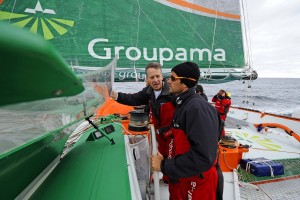

After setting off on the great Jules Verne adventure on three occasions, it was in 2010 that Franck Cammas scored a record time on the course. At the helm of Groupama 3, a maxi-trimaran designed for records, the man nicknamed as the “little Mozart of sailing” pulled off the world tour in 48 days, 7 hours, 44 minutes and 52 seconds. Notably the winner of the Volvo Ocean Race (2011-2012), three Jacques Vabre Transats (2001, 2003 and 2007) and a Route du Rhum (2010), Franck Cammas here retraces his experience of the Jules Verne.

What prompted you to commit to the Trophy for the first time in 2008?
The team and I had already been involved with 60-feet boats for 8 years already, and we wanted to move onto something bigger, in sporting terms. With our partner Groupama, we agreed that the Jules Verne Trophy was a challenge that would suit us both: in sporting terms for us, and in media terms for them. This is why we embarked on a program in 2006, the year in which the boat was constructed. We launched it in 2006, and set out on our first attempt the next year.
What is your favorite memory of the Jules Verne Trophy?
I have plenty of them! But I have to say that when I did the Jules Verne, it was the first time that I went past Cape Horn. When we went past it, we had the wind against us, at 15 knots, with not much wind. It was fun even if we weren’t going very fast. In any case, it was a very moving experience. Next, the arrival was of course a great moment. In 2010, we had fairly bad weather all the way along. We were behind even when we went past the Equator on the way back. We only managed to gain two days once we were in the northern hemisphere on the way back. It was quite tense, so it was a release to finally arrive and beat this record.
What is your worst memory?
In 2010, we were frustrated because we constantly fell into weather impasses. We sailed upwind at Cape Horn and this was the way things remained until the Equator. We weren’t able to open the sails from Cape Horn up to the Equator. We set off near the cut-off date (end of January) and everything went a bit awry in terms of weather. Luckily, we had a good boat that was very versatile – this allowed us to beat the record.
What do you prefer – sailing solo or with a crew?
I haven’t sailed solo since the 2010 Route du Rhum. Overall, I’ve always preferred sailing with a crew, and the dimension of working as a team. I should point out that in a crew, we can use the boat 100 % – something that you can’t do when you’re sailing alone. When you sail solo, you’re forced to gloss over the setup and the fine aspects of steering a little. So in a team, there’s a certain intensity that you don’t find – or less so – when sailing solo.
What does the Jules Verne Trophy mean to you?
It’s the simplest race that exists. There are practically no rules, except regarding the route. So this helps open up opportunities for innovation and investigation on all sporting or technical levels. We see that it isn’t necessarily the largest or most powerful boats that win. The Jules Verne really allows competitors to try out things without any limits being set, making it a competition that reaches extremes. This is pleasant. There isn’t any other race like it.
Do you think about attempting the Jules Verne again one day?
I haven’t thought about it… I’m not closing the door, obviously. It depends on the record because when you commit to the race, there has to be a possibility of beating it. It’s when you believe that you can beat it that you end up lining up on the starting line one day. You also need to have the technical conditions to achieve it, in other words, have an adapted boat. So it’s necessary to either build a suitable boat – and this is a huge operation –, or you need to pick up a boat that is still capable of achieving it, in the way that Idec Sport is in the process of demonstrating.
Idec Sport is of course the former Groupama on which you once sailed…
It’s an old boat, but it’s still proving today that it was designed at a good balance: not too big, very efficient, capable of being sailed solo or by a team. There aren’t many boats like that. It isn’t completely optimized for the solo sailor or for teams, but it’s capable of serving both. And what it does, it does well.
Do you have a message for Francis Joyon and his five teammates, currently attacking the Jules Verne?
Francis has sailed some fantastic times, and notched up some huge days. It’s remarkable! You need to understand that sailing permanently at over 30 knots requires a great deal of attention and agility at the helm; it’s uncomfortable and very noisy. It’s necessarily stressful. Francis and his crew are in the process of finding their limits without going over them. It’s excellent sailing. We can only congratulate them.
Interviewed by Isabelle Trancoen